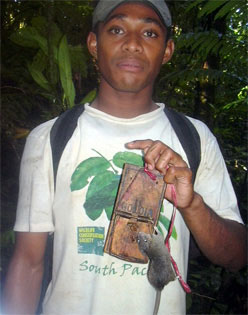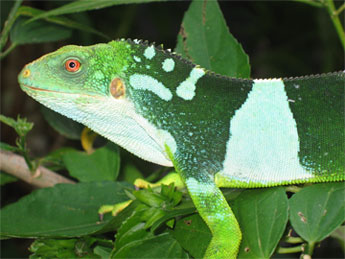Forest protection best way to control rats finds study
WCS
April 13, 2006
Study says standing forest is the best rat control in Fiji Islands
The most cost-effective way to stop non-native rats and mongoose from decimating highly endangered species on larger tropical islands is not by intensive trapping, but instead by preserving the forest blocks where wildlife live, according to a study by the Bronx Zoo-based Wildlife Conservation Society (WCS) and other groups.
The study, which appears in the latest issue of the journal Conservation Biology, found that rats and mongoose in the Fiji Islands rarely penetrate the forest interior, preferring instead to forage along the forest edges.
The study holds potential good news for species like the pink-billed parrotfinch, banded iguana and Fijian land snails which live deep within Fiji’s remaining forests. By using bait stations designed to attract rats and mongoose, the researchers discovered that stations over five kilometers (approximately three miles) from the forest edge were rarely visited.
 WCS’s Alipate Raikabula captures a black rat in the Fijian bush. Photo by Waisea Naisilisili. |
“Protection of the few remaining large blocks of natural forests on Pacific islands may be the most cost-effective approach for conserving many rare species threatened by rats and mongooses,” said WCS researcher David Olson, lead author of the study.
Though the authors are unsure on exactly why rats and mongoose seem to shy away from deep forests, they theorize that natural forests have poorer habitats for reproduction for these invasive species than agricultural areas or secondary forests.
The authors warn that even low levels of rat and mongoose penetration into forest areas can be sufficient over time to cause the decline of native species. Also, the occurrence of logging roads or even the proximity to rivers can allow rats and mongoose to colonize areas where endangered species occur.
 Banded iguana young and eggs are eaten by rats. Photo by Leoni Valentine. |
“Remote forest areas that function as refuges for threatened island species are increasingly rare and should receive the highest priority for conservation on the larger islands of the Pacific,” said David Olson, who said that similar forests exist in Vanuatu, New Caledonia, the Solomon Islands, Samoa, Hawaii and tropical islands in the Caribbean. Authors from the University of the South Pacific also contributed to the study.
This is a modified news release from WCS